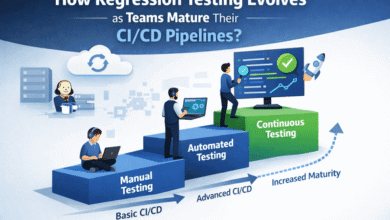What Are the Key Challenges in Implementing Data Governance?

The effective data governance has become a strategic necessity, with the top future challenge for 91% of CIOs being data governance, as the rise in company data collection makes it difficult to deploy safely and effectively. Poor data quality costs $12.9 million yearly, while data breaches cost $4.88 million in 2024. These volumes require strong data governance in modern organizations. While awareness is improving, with 71% of enterprises having a governance structure in 2025, up from 60% in 2023, many firms struggle with execution.
Policies are first, but applying them to complex data ecosystems is difficult. Data governance is defined, companies’ primary data governance concerns are examined, and best practices are provided. We’ll also discuss how Codexon, a technology service provider, may help firms overcome these challenges and succeed in data governance.
What Is Data Governance?
Data governance organizes data for accuracy, safety, compliance, and value. Policies, responsibilities, and practices promote data reliability, accessibility, and organizational alignment, improving decision-making, security, and operational efficiency.
Key Challenges in Data Governance Implementation
Implementing data governance demands organizational change, which is tough. The greatest data governance implementation issues organizations face will be covered:
- Lack of Executive Support and Strategy
Lack of leadership, goals, and results often dooms governance. Adoption struggles without a leader because many underestimate cultural change. Gartner notes that 21% of organizations struggle with leadership gaps in governance. - Siloed Data and Integration Issues
Data scattered across systems and geographies makes consistent governance difficult. Silos cause inefficiency, redundancy, and definition disputes. Integration of sources and tools is problematic for 43% of complicated multi-cloud organizations. - Poor Data Quality and Standards
Governance suffers from inconsistent data, team disputes, and outdated or missing information that leads to bad judgments. PwC argues that poor governance generates redundancy, outdated data, and financial loss. Quality inspections and definitions must be ongoing. - Compliance and Security Risks
CCPA and GDPR rules are strict, yet weak governance increases infractions, penalties, and reputational damage. Managing security, accessibility, and compliance is difficult. - Limited Resources and Expertise
Few have money, talent, or leadership without clear ownership, work delays, duplicates, and are inconsistent, with 62% citing skill shortages. - Cultural Resistance
The government might be strict, so workers who avoid rules for good projects can fail due to poor communication, training, and cultural change.
Data governance strategy is tough but possible with the right approach to overcome technological, organizational, and cultural barriers, silos, quality issues, compliance, and acceptance with limited resources.
How to Overcome Data Governance Challenges
A proactive and deliberate approach can help organizations establish data governance despite the hurdles with the data governance implementation steps. The following strategies can help you overcome the stated obstacles:
- Secure Executive Sponsorship: To secure early leadership support and sponsorship, show the financial consequences of poor governance and link goals to demonstrable results to build companywide commitment.
- Build a Framework and Team: Manage governance continually to minimize confusion, develop a cross-functional team, assign roles, and establish policies, standards, and a roadmap.
- Eliminate Data Silos: Data catalogues and integration improve metadata visibility and rule consistency, and federation can connect data owners to governance.
- Provide Data Quality: Follow company-wide quality standards and profile/clean essential data and tests.
- Embed Security and Privacy: Implement “secure by design” elements, including role-based access, encryption, automated policy enforcement, and regular reviews, to reduce breach risk.
- Leverage Tools and Automation: Governance tools classify, lineage, monitor quality, and automate access; environment-specific solutions scale.
- Train and Build a Data Culture: Appoint data champions, train people, and promote governance so that daily routines contain best practices and governance.
- Start Small, Scale Smart: Pilot in a high-impact area, evaluate, and grow the change policies and tools as business and law change.
Organizations create sustainable data governance through process, technology, and people. Codexon, a data governance solutions provider specializing in data management, cloud, and security, delivers long-term issues and frameworks to assist many achieve.
Data governance practices
Get leadership assistance to ensure governance goals are aligned with business goals and funded:
- Executive Alignment: A governance architecture with defined principles, data standards, and accountable responsibilities reduces ambiguity and effort duplication.
- Clear Framework and Roles: Through data integration and centralized catalogs, eliminate silos for consistent rules and easier data discovery.
- Integrated Data Landscape: Implement quantifiable quality standards, monitor objects, and check processes to maintain correctness and confidence.
- Ongoing Quality Management: Early encryption, access controls, and automated policy enforcement let you stay ahead of changing rules.
- Security and Compliance by Design: To foster long-term commitment, train staff, create internal champions, and explain governance’s financial benefits.
- Incremental Rollout: Start with a focused trial, track progress with KPIs, scale based on outcomes, and tweak as the firm grows.
These guidelines help firms maximize data assets while meeting security and legal standards. Many firms speed up this process by engaging with premier data governance solutions companies like Codexon, whose data management, cloud computing, and security expertise enable these best practices to be employed successfully and efficiently.
How Codexon Can Help with Data Governance
Industry analysts say outside help enhances data governance. Codexon, a cloud, security, managed services, and data management startup, addresses enterprise concerns such as data fragmentation, quality disparity, and compliance changes.
After examining client goals and challenges, they create governance roadmaps, duties, and policies. System encryption and masking use data catalogues and automatic access controls.
To improve data integration and quality, Codexon dissolves silos, centralizes assets, and cleanses data while customizing master data management and DataOps to each organization’s culture.
Training, workshops, and “data champions” keep involvement up. Codexon’s continuing support reduces mistakes and speeds compliance reporting KPIs as firms adapt governance frameworks to shifting legislation, technology, and business demands.
Ready to overcome your data governance challenges? Reach out to Codexon now, let our experts help you create a winning data governance approach that advances your business.




